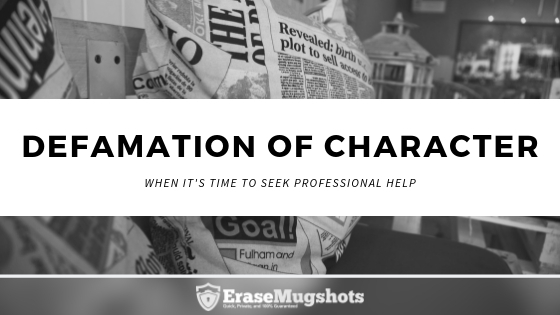100% Satisfaction Guaranteed
We offer a total mugshot removal solution to remove your mugshot and arrest details from the internet once and for all.

Table of Contents
Online defamation of character has taken the internet by storm over recent years. The internet is home to various malicious websites that serve one purpose, to ruin your online reputation.
Learn how to locate negative articles about yourself or your business online. In addition to strategies, you can start implementing today in order to combat this negativity. Everyone has their freedom of speech but when does that turn into defamation?
Stop a brand crisis before it starts by suppressing or entirely removing liable and defamatory content from search engines such as Google, Bing, and Yahoo.
So what exactly is a defamation of character case? What does it take to consider something libel or slander?
In this article, we will discuss how online defamation of character is handled. Whether that be through a defamation lawsuit or handling things out of court.
Make sure you are well informed when it comes to how you can deal with different types of defamation.
In short, defamation of character is an action performed by an individual or business where negative connotations are made often leaving a misleading impression about the specific entity in question (i.e. your business or your name).
By definition defamation of character is, a misleading statement someone makes about you, which they publish as a statement of fact. This harms your personal and professional reputation. Having a negative online reputation can lead to other damages, including financial loss and emotional discomfort. EraseMugshots has many solutions to remove this hurtful information from the internet.
Most businesses have some sort of negative content online, however that doesn’t necessarily mean that they’ve been the victim of defamation.
A negative review online of a consumer voicing their negative thoughts on business is unfortunately not considered defamation unless you can prove it is a lie. If they make claims out of the scope of what you offer you may have a case.
Traditional defamation is the communication of false, negative information that is posted by a third-party (i.e the disgruntled customer).
There is no difference between on and offline defamation, the only key distinction being that it takes place online.
To begin on a defamation claim if you’re an individual, you need to first prove that the statement was false.
If the statement is true, however bad the claims or reviews are, there is no legal standing to take on removing this information. These claims will be barred, review platforms do not let you simply remove reviews because you do not like them. Even if the negative review ruins your reputation you must be able to prove that all claims made were fictitious.
In addition, you must prove that the statement was created by an individual who either knew it had been false at the time or showed “reckless disregard” for whether or not it had been true or false.
Furthermore, defamatory information must be published or posted online. There is no way to prove word-of-mouth in this day and age so make sure to record anything negative you see in case they delete their review later on (i.e. this is the goal).

In order to qualify for a defamation case, you must be able to answer yes to the following questions.
If you have answered yes to the questions above it is more than likely that the courts will side in your favor. By addressing these preliminary questions the courts should assume that you have undergone some form of distress.
If you are a top-level executive or even a celebrity there may be a few more hoops and hurdles for you to jump through. Seeing as you are “famous” (in a sense) you will most likely receive less assistance in regards to removing defamatory content. Most publishers, as well as legal strategists, believe that “it comes with the territory” and celebrities or public figures should be prepared to handle fake news or libel claims.
Here are some popular examples of defamation. Contact us today if you or someone you know is a victim of these malicious attacks on the internet. You only have one reputation, make sure it’s a good one.
It goes without saying, any unnecessary statements or claims about an individual/business that has the sole purpose of ruining their reputation falls under this category.
Although it is the duty of the victim to prove how the claims are false sometimes the offender must do the same. There are many incidents where the defendant must prove that the statements made were indeed factual.
Hurting another individual’s reputation in a professional manner is grounds for a defamation suit. Even claims that have negative impacts causing financial harm can fall into this category.
Additionally, sexual references made about an individual discussing sexually transmitted diseases and sexual acts are another category that falls under the defamation of character.
If relevant claims are made to intentionally harm an individual that is referred to as “mental distress”. The accuser must be required to prove their claims are true which is often tough to come by.
Sexual claims on the internet are generally taken more seriously over personal reputation or criminal claims onto another individual due to the subject matter.
Also, claims made in reference to adultery is frowned upon as well. These claims damage not only an individual’s marriage but may disrupt the relationships of other family members and friends along the way. It is immoral to make these statements on the internet.
If an individual is blamed for a criminal charge online by a third-party with no viable proof or facts this can be considered slander as well. The burden of truth will often win the defamation suit alone.
If you have any further questions or would like to learn more about removing defamatory content from the internet please complete the form below. We will reach out to you within 48-hours to answer all of your questions and concerns.
We offer a total mugshot removal solution to remove your mugshot and arrest details from the internet once and for all.